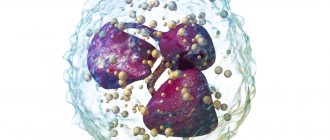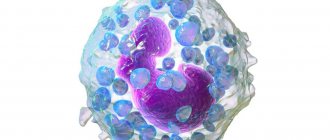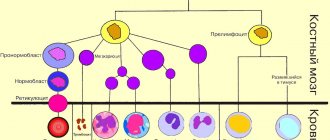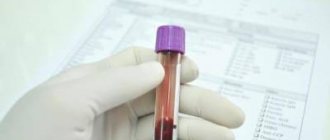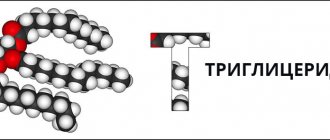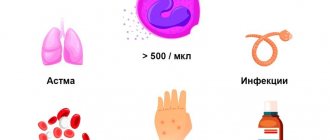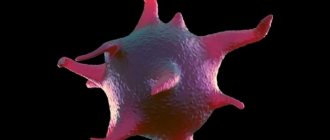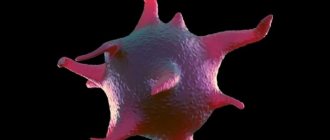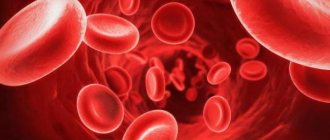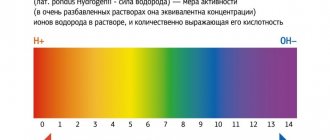Gastritis
Pancreatitis
Worms
64186 January 20
IMPORTANT!
The information in this section cannot be used for self-diagnosis and self-treatment.
In case of pain or other exacerbation of the disease, diagnostic tests should be prescribed only by the attending physician. To make a diagnosis and properly prescribe treatment, you should contact your doctor. We remind you that independent interpretation of the results is unacceptable; the information below is for reference only.
Vitamin B12: indications for prescription, rules for preparing for the test, interpretation of results and normal indicators.
Indications for the purpose of the study
Vitamin B12 is the common name for two chemical variants of the cobalamin molecule (cyanocobalamin, hydroxocobalamin), which are converted into active compounds in the body.
Sometimes vitamin B12 is understood as a combination of the four most studied forms of chemical varieties of cobalamin containing cobalt (cyanocobalamin, hydroxocobalamin, methylcobalamin, adenosylcobalamin).
In the literature, vitamin B12 usually means cyanocobalamin, since it is in this form that a significant part of vitamin B12 enters the human body.
The vitamin B12 molecule is the largest of all vitamin molecules and the only one in living nature that contains a metal atom (cobalt).
Vitamin B12 is the only vitamin that is synthesized in nature exclusively by microorganisms and deposited in the liver.
Cyanocobalamin enters the human body with food of animal origin, and its main sources are animal liver, fish, eggs and dairy products. Vegetables and fruits do not contain vitamin B12.
Cobalamin levels depend on how much of the vitamin comes from food, how much is excreted, and how much is consumed by the body.
With a balanced diet, a person receives from 5 to 15 mcg of vitamin B12 daily. The daily requirement for vitamin B12 for adults is from 2 to 3 mcg/day, for children – from 0.3 to 1.4 mcg/day. During pregnancy and lactation, the body's daily need for vitamin B12 increases to 7.6 mcg/day. After the cessation of vitamin intake into the human body, its deficiency (up to anemia) develops over several years. The incidence of vitamin B12 deficiency in the age group over 60 years is 40%.
Absorption of cobalamin occurs in the intestine in the presence of a specific enzyme - intrinsic factor of Castle, which is synthesized by the cells of the gastric mucosa. Vitamin B12 supplied with food binds to this enzyme, and the resulting complex interacts with the receptors of the cells of the ileal mucosa. During absorption, the complex disintegrates - vitamin B12 penetrates through the wall of the small intestine into the bloodstream, where it binds to a transport protein that delivers it to consumer cells. Unclaimed cobalamin accumulates in reserve - mainly in the liver, but also in the spleen, lungs and kidneys.
Vitamin B12 is involved in the maturation of red blood cells, in the processing of homocysteine, the metabolism of folate, vitamin D, cholesterol, etc. Thanks to vitamin B12, blood cells, mucous membranes, and skin are renewed.
With vitamin B12 deficiency, an ineffective type of hematopoiesis develops: red blood cell precursor cells grow but do not divide, resulting in the formation of small numbers of giant red blood cells. Megaloblastic anemia develops.
Vitamin B12 deficiency causes changes and damage to neurons in the brain and spinal cord, which can result in physical, neurological and mental disorders.
In medicine, cyanocobalamin is used to treat anemia, polyneuritis, multiple sclerosis, radiculitis, and normalize lipid metabolism. It has been established that the administration of high doses of the vitamin significantly reduces the progression of atherosclerosis in the early stages of the process. In pediatrics, vitamin B12 is used to treat low birth weight newborns.
The use of B vitamins can reduce the content of homocysteine in the blood, which damages the walls of blood vessels, making their surface loose. Cholesterol and calcium are deposited on the damaged surface, forming an atherosclerotic plaque. Elevated homocysteine levels increase the risk of thrombosis. For a 2.5 μmol/L increase in plasma homocysteine levels, the risk of myocardial infarction increases by 10% and the risk of stroke by 20%.
Thus, the following indications are distinguished for determining the level of vitamin B12:
- diagnosis of anemia;
- diagnosis of vitamin B12 absorption disorders;
- monitoring vitamin levels during a strict vegetarian diet;
- diagnosis of congenital forms of vitamin B12 deficiency;
- monitoring the level of vitamin B12 during the treatment of neurological and mental diseases, in oncological practice;
- age over 50 years;
- after surgical interventions on the gastrointestinal tract (gastrectomy, extensive resections of the small intestine).
Interpretation:
- Chronic renal failure, severe congestive heart failure, elevated transcobalamin levels, liver disease, acute and chronic myeloid leukemia, monocytic leukemia, erythroleukemia.
- Vitamin B12 deficiency. The main causes: atrophic gastritis, gastrectomy, stomach cancer, gastric polyposis, malabsorption syndrome, small intestinal cancer, chronic pancreatitis with impaired trypsin secretion, infestation with a broad tapeworm, whipworm.
Sample result (PDF)
Preparation for the procedure
- It is recommended to donate blood in the morning from 8 to 11 o’clock, on an empty stomach (at least 8 hours of fasting), you can drink water as usual.
- Agree with the doctor who ordered the test on the list of medications you are taking that may affect the test result.
- Avoid drinking alcohol on the eve of the test and do not smoke for 1 hour before the test.
- Avoid physical and emotional stress the day before the test.
- It is not advisable to donate blood for laboratory testing soon after physiotherapeutic procedures, instrumental examination and other medical interventions.
- When monitoring laboratory parameters over time, it is recommended to conduct repeated studies under the same conditions: in the same laboratory (using the same method) and at approximately the same time of day.
Vitamin B. Hypervitaminosis
Symptoms
Taking into account the above features of the metabolism of B vitamins, one could assume a statistical predominance of one-time, acute overdoses caused by more or less random intake of concentrated drugs in large volumes.
However, if we add psychological (self-prescribed treatment and prevention) and iatrogenic (inadequate dosages of vitamin therapy prescribed by a doctor) to the biochemical nuances, a significant proportion of chronic hypervitaminosis B also becomes clear. The vast majority of such cases are overdoses of B1, B3, B5, B6, B9 and B12. The most typical and common symptoms are increased excitability, emotional instability, tachycardia, headaches, nausea, redness of the skin, dyssomnia (certain sleep disorders).
Vitamin B1 (thiamine) in excess doses can cause anaphylactic shock, skin reactions such as urticaria and increased photosensitivity, kidney and liver dysfunction.
Vitamin B3 (niacin, vitamin PP, nicotinic acid) in overdose causes, in addition to the above-mentioned symptom complex, severe dyspepsia, dizziness, itching and paresthesia (false tactile sensations), muscle pain, cardiovascular disorders (high blood pressure in a standing position).
Acute hypervitaminosis B5 (pantothenic acid) can, among other things, cause dehydration.
Overdose of B6 (adermine, pyridoxine) – atactic phenomena in the form of impaired coordination of movements, confusion, convulsions, increased acidity of gastric secretions.
Hypervitaminosis B9 (folic acid) – cramps in the lower extremities, allergic reactions. In addition, in 2016 , the results of a study conducted by employees of the Johns Hopkins Institute (USA) on medical and statistical data for the period 1998-2013 were published. It has been shown that unreasonable and deliberately excessive consumption of folic acid and cobalt-containing vitamins B12 by pregnant women (and the importance of these vitamins during gestation is well known) increases the risk of autism in children by 2-3 times, especially if “hyperprophylaxis” occurred in the third trimester. In addition, B12 increases blood clotting and, accordingly, the risk of blood clots. In general, the results of the study make us think seriously and once again raise the question of the feasibility, the need for the most careful monitoring, taking into account all indications and contraindications for vitamin therapy and vitamin prophylaxis during pregnancy: in many cases, the optimal level of con in the blood was exceeded by 15-17 or more times . The most severe complications of hypervitaminosis B include renal and liver failure, steatohepatosis, pulmonary edema, anaphylactic shock, exacerbation of gastroenterological and cardiac diseases.
It is interesting to note that the clinical picture of hypervitaminosis B is largely reminiscent or even repeats the symptoms of hypovitaminosis.
Who should definitely take B12?
For an adult, the standard daily requirement for B12 is about 2.4 mcg. But it is worth remembering that this amount is only valid for those who are not subject to nervous shock and do not have bad habits or excessive stress. During times of stress, nicotine addiction, increased workload and fatigue, this figure can increase in the range of 10 to 20%. In such cases, we advise you to choose foods that are rich in vitamin B12 and contain it in large quantities. We have listed cases in which the need to take the substance increases:
- for those who are actively involved in sports, especially professional athletes;
- if your job involves heavy physical activity;
- undergoing rehabilitation after alcohol addiction;
- pregnant and lactating women;
- during puberty in adolescents
- children in the period of active growth;
If you belong to any category from this list, you should be especially careful to ensure that your body receives all the necessary substances. A diet that includes healthy, vitamin-rich foods, as well as proper intake of medications prescribed by your doctor, is a guarantee of your impeccable health, beauty and youth for many years.
What else is prescribed with this study?
B vitamins (B1,B2,B3,B5,B6,B9,B12)
4.23.1. Venous blood 7 days
13 140 RUR Add to cart
Homocysteine
1.53. Venous blood 1 day
RUR 1,890 Add to cart
Complete blood count without leukocyte formula (venous blood)
3.1.1. Venous blood 1 day
330 RUR Add to cart
Folates
4.3. Venous blood 1 day
RUR 1,100 Add to cart
Vitamin B12
Vitamins B12 are a whole group of cobalt-containing biologically active substances. One of the main ones in it is cyanocobalamin. It is involved in the production of red blood cells and the process of hematopoiesis. Contained mainly in products of animal origin - meat, milk, eggs. Therefore, deficiency is most often observed in people following a strict vegetarian diet, in pregnant women who require an increased amount of B12, as well as in atrophic gastritis and chronic inflammatory diseases of the small intestine.
Vitamin B1
Cellular energy booster that promotes growth and development. Vitamin B1 increases mental and physical performance, improves detoxification function and metabolism in the nervous system. It also improves mood, has a mild analgesic and wound-healing effect.
Vitamin B1 deficiency causes various disorders in the nervous, cardiovascular and digestive systems. To compensate for its deficiency, include buckwheat, corn, cashews, and lentils in your diet.
Main symptoms of vitamin B1 deficiency
- loss of appetite;
- violation of movement coordination;
- depression, nervousness;
- weakening of cognitive functions (memory loss);
- muscle weakness.
An extreme form of vitamin deficiency is Beriberi disease, which damages the peripheral nerves or the cardiovascular system. As a result, muscles, especially the legs, become exhausted, severe pain appears in the calves, weakness develops, and gait worsens.
Causes of Vitamin B1 Deficiency
- constant consumption of refined products (high-grade flour and products made from it, polished rice);
- increased need for vitamin (pregnancy, breastfeeding, stress, physical activity, infections);
- chronic diseases (diabetes mellitus, thyrotoxicosis, antibiotic poisoning, alcoholism);
- smoking;
- Excessive consumption of tea and coffee, as caffeine destroys vitamin B1.
If you notice that your mood has worsened, cramps have appeared in the calf muscles, and your appetite has disappeared against the background of constant stress, perform the study 95-10-201 - Vitamin B1 (thiamine) in CITILAB. The analysis helps to identify vitamin B1 deficiency, prescribe medications in a timely manner and adjust the diet.
B12 overdose
Of course, you shouldn’t abuse this substance either. Moderation must be observed even in the most useful products and preparations. Uncontrolled use will only harm your body and certainly will not be beneficial. Hypervitaminosis – overdose, manifests itself in the following symptoms:
- Pain and stabbing on the left side of the chest, near the heart
- Increased excitability of the nervous system
- The number of heart beats per minute increases
An overdose of B12 will not bring serious, dangerous, or even fatal consequences, since this vitamin is water-soluble. Its excess easily leaves your body through urine. But still, this process requires a certain amount of time, and during this period hypervitaminosis can harm your body. Therefore, you should refrain from increased use of dietary supplements and vitamin complexes. If you buy the drug at the pharmacy, strictly follow the instructions and strictly observe the dosage. If you notice side effects, a deterioration in your general condition and well-being, temporarily stop using the complex and immediately consult a doctor. Do not resume the course until your specialist gives you permission.
Vitamin B5
Pantothenic acid (vitamin B5) has a stress-protective effect and is part of coenzyme A, which takes part in the metabolic processes of proteins, fats, and carbohydrates.
Vitamin B5 is necessary for the synthesis of vital substances such as hemoglobin, cholesterol, histamine, acetylcholine. In addition, it activates the synthesis of glucocorticosteroids (adrenal hormones), which have immunoregulatory, antiallergic, and anti-inflammatory effects. It is important to understand that without pantothenic acid, other vitamins are poorly or not absorbed at all. Mackerel, sardines, tuna, sweet bell peppers, and pine nuts will help you add a portion of the vitamin to your diet.
Main symptoms of vitamin B5 deficiency
- fatigue, weakness, apathy;
- the appearance of a burning sensation in the toes, often numbness;
- with a severe deficiency, “burning feet” syndrome occurs - excruciating pain in the legs at night.
With a lack of pantothenic acid, the production of gastric juice decreases, heart function worsens, neuritis develops, and the risk of developing skin diseases and duodenal ulcers increases.
Causes of Vitamin B5 Deficiency
- long-term malnutrition (food poor in proteins, fats, vitamin C and B vitamins);
- suppression of intestinal microflora, including long-term use of antibiotics and sulfa drugs;
- intestinal diseases of various nature.
To promptly identify pantothenic acid deficiency, go to CITILAB study 95-10-202 - Vitamin B5 (pantothenic acid).
Why does the body need vitamin B12?
This substance plays a significant role in all vital processes occurring in our body. It’s not for nothing that hypovitaminosis, a lack of vitamins, is considered a serious disorder that doctors advise to eliminate immediately. The full list of functions that this group of connections performs is very large; here we will list only the most important and basic:
- Regulates the production of red blood cells: promotes formation, prevents their destruction and shortage.
- Positively affects the process of hematopoiesis.
- Promotes complete absorption of protein by the body.
- Improves tissue regeneration of the liver, kidneys, and heart.
- Prevents the development of diseases in these organs.
- Protects the nervous system from destruction and the harmful effects of external and internal adverse factors.
- Preventing the occurrence of anemia.
- Normalizes the functioning of enzymes.
- Activates cell division.
It is especially worth noting its ability to cover nerve cells with the myelin sheath, which is necessary for their complete and reliable protection. This is a unique function of vitamin B12. Other substances are not able to form, form and maintain the presence of this shell. This property of B12 can be a real salvation for you if your work and lifestyle involve constant nervous tension and stress. By taking your daily dose of the vitamin, you will protect yourself from depression, depression, irritability, mood swings and aggression, which can so often be found among residents of modern large cities.
People working in leadership positions who are under stress due to a high degree of responsibility and a large volume of tasks are especially susceptible to nervous disorders. This is also true for those who are exposed to the human factor: teachers, doctors, service workers. It would also be useful to take preventive measures for students during the period of taking exams and preparing for them.
Vitamin B6
Essentially, vitamin B6 (pyridoxine) is a metabolism “activator.” It is necessary for regulating the absorption of proteins, the exchange of amino acids involved in the synthesis of basic neurotransmitters and hemoglobin. With the participation of pyridoxine, glucose is delivered to cells, including brain cells. Vitamin B6 affects cognitive functions: improves memory, thinking, and also improves mood and helps resist stress.
Contained in many plant foods - bananas, nuts (pistachios, hazelnuts), avocados, beans, soybeans, beef liver. It is important to remember that with prolonged or improper heat treatment of foods, this vitamin is destroyed.
Main symptoms of vitamin B6 deficiency
- fatigue, depression;
- hair loss;
- “jams” in the corners of the lips.
A clear lack of vitamin B6 reduces the synthesis of dopamine, serotonin, gamma-aminobutyric acid, and melatonin. This can lead to psychological and physiological disorders, insomnia, decreased intellectual abilities, irritability, apathy, or, conversely, aggressive behavior.
Causes of Vitamin B6 Deficiency
- weakened condition, including after surgery, serious illness;
- atherosclerosis;
- cardiovascular diseases;
- pregnancy;
- long-term excess consumption of protein foods;
- increased physical activity;
- liver diseases, gastritis;
- anemia.
If you notice that your hairstyle has become less voluminous, severe dry skin has appeared in the area of the nasolabial fold, above the eyebrows, in general the skin has become drier and rougher, cuts and scratches are slowly healing - do not put off visiting a doctor. The first thing you need to do is donate blood to CITILAB for research 95-10-203 Vitamin B6 (pyridoxine), which will help determine whether there is a deficiency of vitamin B6 in the body or whether there is enough of it.
